Ex-Engineer Turned Farmer Grows Apples & Exotic Jamuns in Maharashtra’s 44 Degree Heat
When you hear the word apples, do you instantly wander to Kinnaur’s picturesque apple orchards in the cool climate of Himachal Pradesh, picturing farmers carefully plucking crispy and juicy fruits into baskets on their backs?
Remarkably, those very apples are now thriving in Maharashtra’s warm climate.
Growing apples in Maharashtra might seem like a paradox but Vikrant Kale is changing that narrative by successfully cultivating apples in his village Wakadi, near Shirdi amidst scorching summers where temperature shoots as high as 44 degrees.
What started as an unlikely dream has become a thriving example of innovative agriculture in a region known more for heat than horticulture.
The engineer-turned-farmer was determined to expand apple cultivation in the state to make fresh, locally grown apples available. “Apples are a crunchy and juicy fruit. Water content and flavours of apples diminish by the time they reach consumers if grown elsewhere,” he notes.
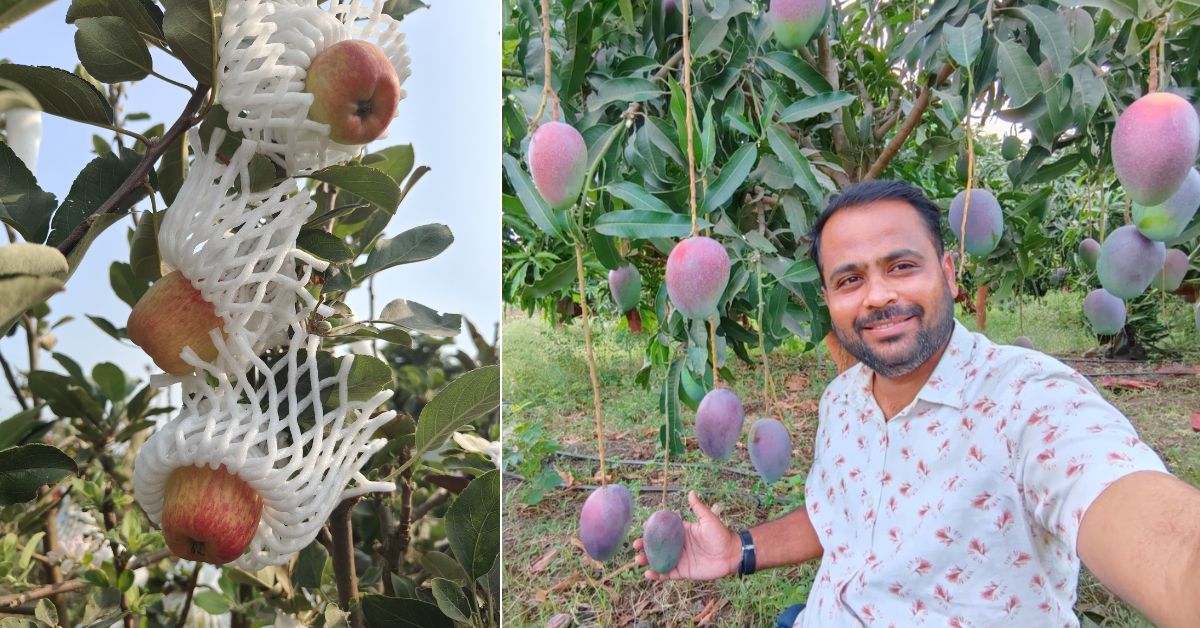 In 2017, Vikrant quit his desk job to return to his roots: farming.
In 2017, Vikrant quit his desk job to return to his roots: farming.
Vikrant saw great potential in expanding the apple-growing regions beyond the traditionally cold climates of Himachal. Currently, he is cultivating apples on two acres of land, with a total annual apple production of up to 16,000 kilograms that earns him Rs four to five lakh per acre from apple farming alone. With this, he has successfully established a market in Maharashtra, Karnataka, Gujarat, Madhya Pradesh, and Rajasthan.
Life beyond 10 by 10 cubicle
But Vikrant’s story doesn’t begin in the fields. It begins behind a desk which he would eventually leave in pursuit of purpose.
Having pursued an engineering degree in Information Technology from the prestigious Walchand Institute of Technology in Solapur, Vikrant initially ventured into the corporate world.
He worked as a project manager with esteemed organisations such as the Board of Control for Cricket in India (BCCI) and the Indian Super League, contributing to the development of sports infrastructure across cities like Pune, Dehradun, and Guwahati.
Despite his success, he realised that a desk-bound job was not where his passion lay. In 2017, Vikrant made the pivotal decision to return to his roots: farming.
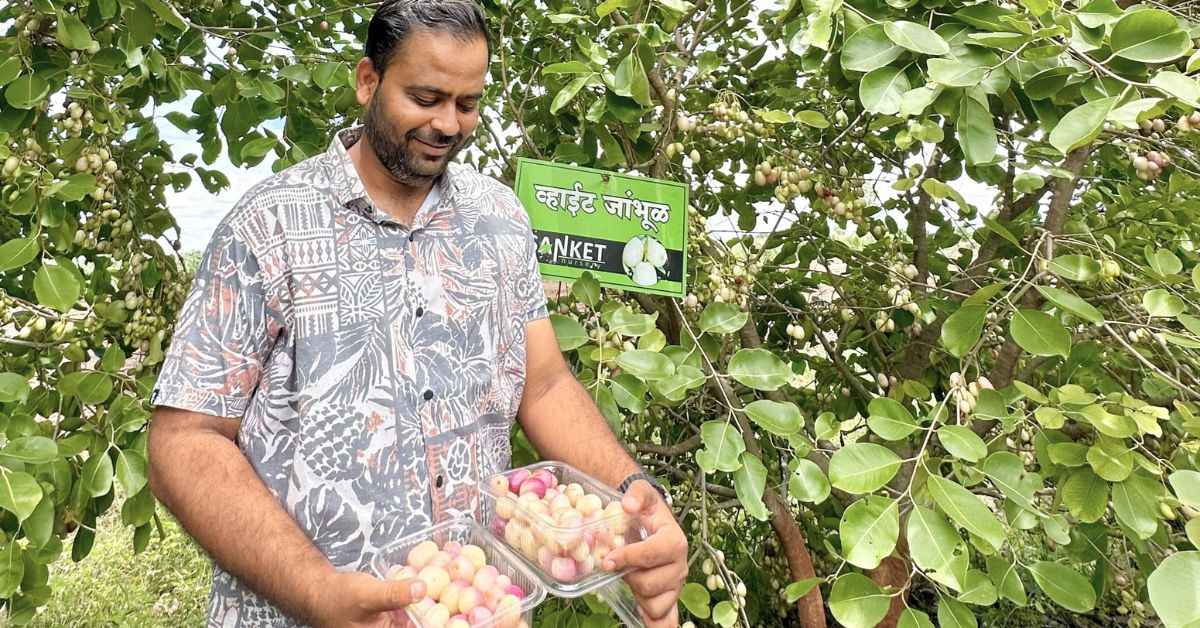 Engineer-turned-farmer Vikrant cultivates a wide range of fruits, including white jamuns, mangoes, apples, and much more.
Engineer-turned-farmer Vikrant cultivates a wide range of fruits, including white jamuns, mangoes, apples, and much more.
He embraced the opportunity to be part of his family’s 35-year-old nursery and orchard business. This was a homecoming that allowed him to delve into his love for open fields and nature – a stark contrast from the confines of corporate cubicles. “I did not like job-oriented work. I have spent all my life in field open areas and I could not sit in a 10 by 10 cubicle. I understood that after spending two to three years,” he adds.
Under the guidance of his father, who had long been experimenting with various crops depending on market demands, Vikrant began exploring innovative agricultural practices.
“My grandfather would grow wheat, soybean, and sugarcane. Then, he introduced pomegranates and guavas. Our family has always welcomed experiments. To be a successful and profitable farmer, it is imperative,” he says.
Apple farming in 44 degrees
It was this spirit of experimentation that led Vikrant to try something almost unthinkable: growing apples in a region known for its extreme heat.
One of Vikrant’s boldest ventures was the cultivation of apples, a fruit that traditionally thrives in cooler climates. Recognising the potential of growing this coveted fruit in Maharashtra, Vikrant experimented with several apple varieties from Himachal Pradesh.
He spent two months in Himachal Pradesh learning the intricacies of apple cultivation and then tailored those techniques to suit the local environment back home.
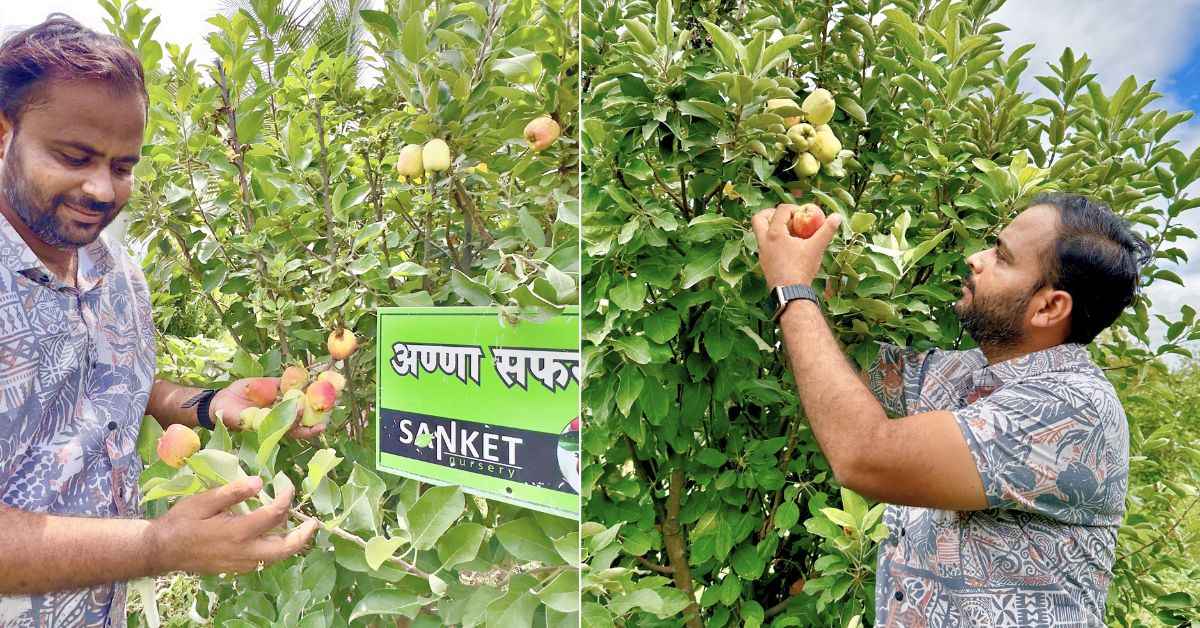 Vikrant grows apples on two acres of land, with a total annual apple production of up to 16,000 kg.
Vikrant grows apples on two acres of land, with a total annual apple production of up to 16,000 kg.
In 2019, he purchased 400 saplings of the promising ‘Ana’ variety of Israel, known for its sweet flavour and distinct yellow colour. The variety is specifically bred to withstand warmer climates, making them ideal for Maharashtra’s hot summers.
Vikrant says his approach to apple farming is meticulous. “I emphasised the importance of understanding the soil and climate to ensure that the chosen variety can truly adapt to the conditions of my native Maharashtra,” he adds.
In the space of 14 feet between two rows of apple saplings, he initially grew traditional crops like onions and soybeans. This ensured continuous productivity and soil enrichment while waiting for the apples to mature. “We got the first fruit after three years,” he smiles.
Vikrant’s apple trees, at full maturity, are capable of producing 12,000 to 16,000 kilograms of apples annually, with each plant yielding 30-40 kilograms of fruit. “This is equivalent to apple yields in Himachal,” he says with pride.
Switching to exotic horticulture crops
But Vikrant’s vision didn’t stop at apples. His farm has become a living laboratory for exotic and medicinal crops, adapted to Indian climates.
Aside from apples, he has diversified his farm’s offerings to include exotic crops like white jamun, avocados, and pink coconuts across 40 acres of his farm.
His cultivation of white jamun, a Thai dwarf variety known for its sweetness and increasing medicinal value amid rising diabetes rates in India, exemplifies his progressive and innovative approach.
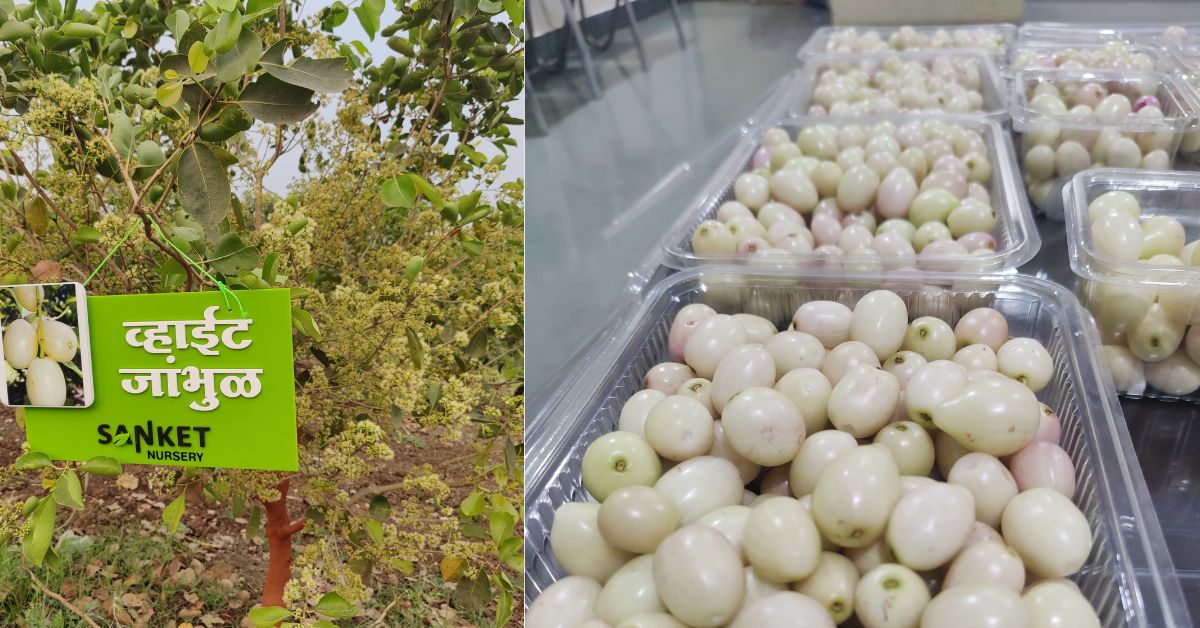 Vikrant has diversified his farm’s offerings to include exotic crops like white jamun.
Vikrant has diversified his farm’s offerings to include exotic crops like white jamun.
“While white jamun, being a perishable crop, poses unique marketing challenges, I have successfully cultivated a good market base for it. I earn around Rs 8-10 lakh per acre from white jamun,” he adds.
Vikrant’s venture is not merely about commercial success. His commitment to advancing horticultural knowledge is reflected in his efforts to train over 1,000 horticulture students through agro-tourism initiatives on a dedicated 16-acre plot.
His farm operates as a demonstration plot, providing fellow farmers with insights and technical know-how to replicate his successes on a smaller scale. This peer support network, coupled with his active learning from social media and nursery networks, ensures continuous innovation and adaptation.
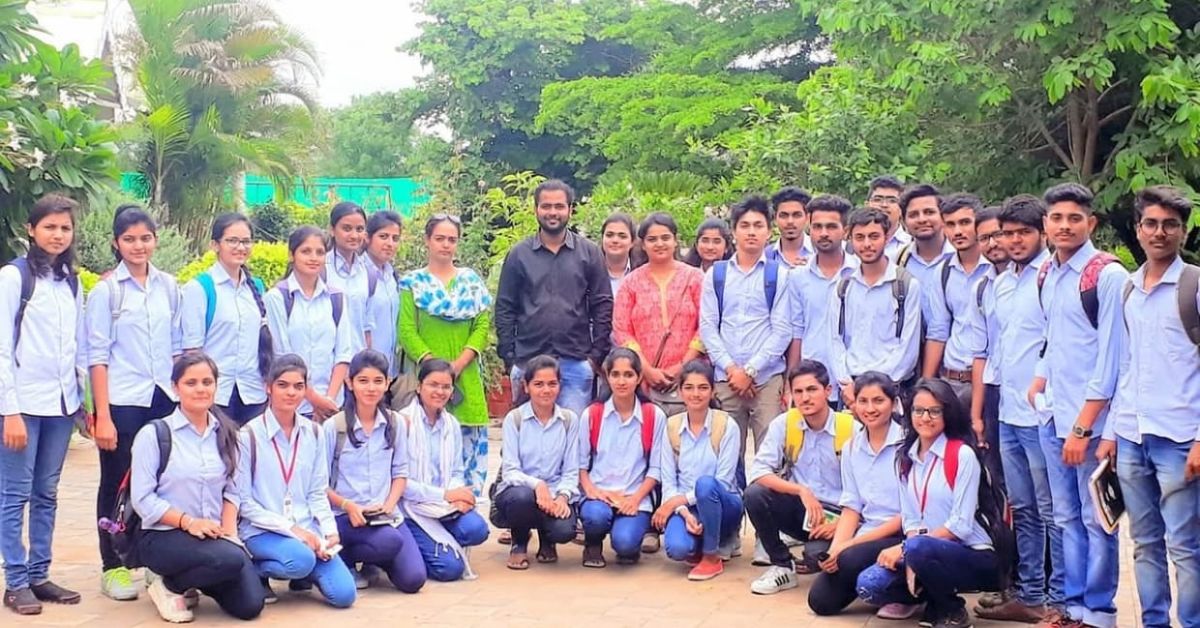 Vikrant trains horticulture students through agro-tourism initiatives.
Vikrant trains horticulture students through agro-tourism initiatives.
“We keep dedicated farm areas to experiment with new crops, and not all crops are successful. For instance, we tried to grow kiwi but the plant got burnt in the harsh weather. So, through trials and errors, we know what can work for us,” he adds.
One of the farmers Vikrant trained is Sachin Chole. Traditionally, he had been growing soybeans and black jamuns in his village Astagaon, but later turned to growing white jamuns too on four acres of land. “It was the first time I learnt about white jamuns from Vikrant ji. Other than offering health benefits, white jamuns fetch me Rs one and a half lakh as against Rs 50,000 for soybean per acre. I am extremely happy with the results, however, more efforts are required to spread the benefits of exotic fruits,” he adds.
Farming as a knowledge system, not just a tradition
Vikrant highlights that, unlike common belief, agriculture requires significant expertise. He challenges the perception that farming is for people who lack knowledge, stating that it is quite the opposite. “Farming is a game of intellect due to the daily challenges it presents, such as labourer shortages and long-term climatic variations. It involves strategic planning and adaptation,” he says.
Vikrant’s efforts have not only redefined apple farming in the hot climate of Maharashtra but also expanded the horizon of what is agriculturally possible in the country’s diverse climatic landscape. “With the right knowledge and approach, even the most improbable ambitions can bear fruit,” he says.
Edited by Saumya Singh; all images courtesy: Vikrant Kale.
##QA-TP1##
News